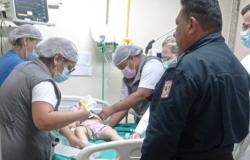There are “good mosquitoes” loose in the air. The Municipal Health Department (SMS) of Rio, the Oswaldo Cruz Foundation (Fiocruz) and the World Mosquito Program Brazil (WMP Brasil) began, this Tuesday morning, another stage in the expansion of the Wolbachia method to combat to dengue. Mosquitoes that do not cause the disease were released in Caju, and will also be released in the Center and on Paquetá Island. Actions at this stage continue until August.
- Dengue in Rio: Department of Health announces end of epidemic in the capital
- In combat: Duque de Caxias expands network of health units for vaccination against dengue
This method consists of introducing Wolbachia into Aedes aegypti mosquitoes, which, with the change, are called Wolbitos. They do not transmit the virus that causes dengue, zika, chikungunya and yellow fever. Once released into neighborhoods, with natural reproduction, the Aedes aegypti population in these regions will be gradually replaced, in a self-sufficient and sustainable way, by mosquitoes incapable of causing these diseases. The releases do not pose any risks.
According to WMP Brasil, Wolbachia is a bacterium present in around 50% of insects, including some mosquitoes, but is not found naturally in Aedes aegypti. In laboratory research, it was shown that the bacteria cannot be transmitted to humans or other mammals.
“The Department of Health hopes, with this expansion, to strengthen the Wolbachia Method in the city and help control arboviruses in neighborhoods. Caju is a place with a high incidence of dengue fever and the city center is a strategic area due to the large circulation of people. Paquetá is an island with a considerable distance from the coast, which creates specific conditions that will be very interesting to be analyzed in this work with the Wolbitos”, says the municipal secretary of Health, Daniel Soranz.
According to the epidemiological bulletin from Rio City Hall, 396 cases were recorded in the Center in the first three months of this year, of which 113 in March alone. In Caju, this year alone there have been 389 cases, 123 of which last month alone. In Paquetá, there are 235 cases in three months of 2024, 76 in the last one.
The release of adult Aedes aegypti can be done by car or on foot. During the actions, tubes containing mosquitoes with Wolbachia are used and, as the employee advances on the ground, they open the containers and release the Aedes, explains WMP Brasil.
The method is just one of those used to combat the proliferation of the mosquito that transmits dengue. Other actions must be aligned, such as taking care to avoid the accumulation of water and correctly cleaning possible outbreaks of the disease.
Currently, 29 neighborhoods on Ilha do Governador and surrounding areas already have the presence of mosquitoes with Wolbachia from release actions between the end of 2016 and 2019, and until 2021 some specific releases were carried out. Epidemiological monitoring is carried out with data from the National Notification System (Sinan) to identify the impact of the method. The work with the Wolbachia Method is led by Fiocruz, in partnership with WMP Brasil and local governments, with funding from the Ministry of Health.
End of the dengue epidemic in Rio
Last Friday, Daniel Soranz announced the end of the dengue epidemic in the city of Rio. The reduction in the number of cases of the disease led to a change in the panorama in the city. According to the secretary, the epidemic was characterized by an increase in the number of cases above expectations for the period. The municipal network treated 2,614 people with dengue fever in a single day, in the last week of February. In the last two weeks, the network treated less than 5 people with the disease per day.
By the end of March, the city of Rio had 82,089 cases of dengue and 7 deaths. The hubs that were set up to serve the population will become flu vaccination points.
Success in neighboring territory
In February this year, the City Hall of Niterói, a municipality neighboring the capital of Rio de Janeiro, in the Metropolitan Region of Rio, announced that the city is the first in the country 100% protected by the method.
In Niterói, work began in 2015 with a pilot action in Jurujuba. Two years later it was expanded in the municipality with coverage in 33 neighborhoods in the Bahia and Oceânica beach regions. In 2021, data showed a reduction of around 70% in cases of dengue, 60% of chikungunya and 40% of Zika in areas where there was intervention using the method. At that time, 75% of the territory was covered.
Vaccination calendar still open
In the city of Rio, vaccination against dengue is still on the calendar for two audiences: children and adolescents aged between 10 and 14 years old and residents of Guaratiba aged between 18 and 60 years old.
Carioquinhas are included in the national calendar, organized by the Ministry of Health. Children and adolescents between 10 and 14 years old have until this Saturday, the 6th, to receive the first dose at one of the stations. The second dose is applied three months apart. The vaccine protects against the four serotypes of dengue. To find the nearest health unit, access here.
Residents of Guaratiba, in the West Zone of Rio, aged 18 to 40, can also be vaccinated against dengue. The action is part of a survey, started in February this year, organized by Fiocruz, the Ministry of Health and the SMS of Rio, in order to assist in decision-making on public policies in the Unified Health System (SUS). Residents of the region must pre-register on the website riosemdengue.prefeitura.rio/guaratiba.
Tags: mosquitoes combat dengue released action neighborhoods Rio
--





